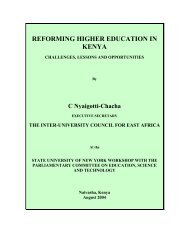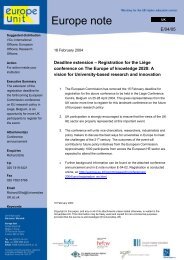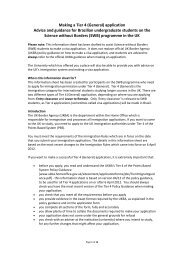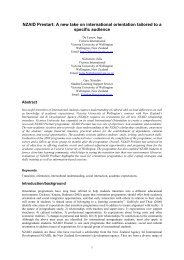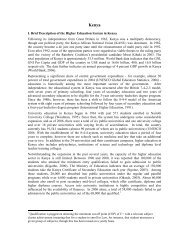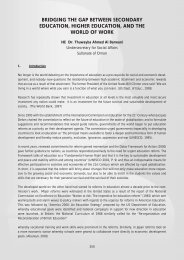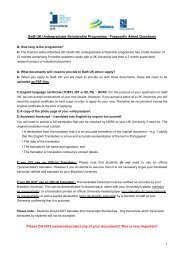POSITIONING TO MEET GLOBAL COMPETITION: THE HIGHER ...
POSITIONING TO MEET GLOBAL COMPETITION: THE HIGHER ...
POSITIONING TO MEET GLOBAL COMPETITION: THE HIGHER ...
You also want an ePaper? Increase the reach of your titles
YUMPU automatically turns print PDFs into web optimized ePapers that Google loves.
International forum: “Globalization and Integration in higher education”<br />
the body that formulates the policies, standards, and guidelines for higher education. The<br />
goal is to facilitate rather than interfere in the productive growth of institutions.<br />
Enabling internationalization by the CHED is evident in the Medium-Term Higher<br />
Education Development Plan 2004 – 2010. Internationalization is explicitly stated as one<br />
of the four missions: “to accelerate the development of high-level professionals ready to<br />
meet international competition.” It is found likewise in two of the four goals, namely: “the<br />
provision of undergraduate and graduate education that meets international standards of<br />
quality and excellence, and the generation and diffusion of knowledge in the broad range<br />
of discipline relevant and responsive to the dynamically changing domestic and<br />
international environments.”<br />
The role of the state is not only seen as an enabler but also as a protector. Globalization<br />
will bring with it power influence by other foreign governments promoting their own<br />
interests. The state should establish structures to provide ready assistance when needed, to<br />
deter and to mitigate any of the negative effects that globalization may bring. It is<br />
necessary that the entity tasked with this big responsibility will be given the resources and<br />
the capabilities to perform the task well. The state should develop the capacity and the<br />
political will to have the regulatory systems that can monitor and tow in line even out-ofthe<br />
country providers (Altbach and Knight, 2006).<br />
Development of quality assurance and protocols. Globalization opens wide the doors to<br />
entities that want to dip their hands in the higher education foray. This brings the<br />
challenge of quality assurance and accreditation. The capability to monitor the quality of<br />
imported and exported programs is in most cases inadequate and therefore should be<br />
addressed. Many bodies involved in quality assurance and accreditation range from<br />
individual institutions and providers, national quality assurance teams, non-government<br />
and independent accreditation organizations, professional organizations, and regional or<br />
interregional organizations. The challenge is to collaborate and build a system that has<br />
unity and integrity. Altbach and Knight (2006) noted that many higher education<br />
institutions have adequate quality assurance processes for domestic delivery but these<br />
processes do not cover working across cultures, in a foreign regulatory environment, and<br />
with a foreign partner.<br />
A ticklish issue that needs urgent attention is that of credit transfers. Many universities in<br />
the developing countries face the dilemma of how to credit an activity done in an<br />
exchange program for lack of measures to this effect. To cope with this limitation, some<br />
universities work by incorporating specific reciprocity provisions in their Memoranda of<br />
Agreement.<br />
The need to have written policies and guidelines on globalization is crucial. In the<br />
Philippines, the Commission on Higher Education has issued several memoranda<br />
stipulating therein policies and guidelines on transnational education, international<br />
linkages and twinning programs, and international practicum programs. This is important<br />
as it provides the needed framework in such undertakings. However, in terms of<br />
internationalization as already elaborated, there is much more to be desired.<br />
For one, the development of protocols can guide the process of internationalization better.<br />
It will facilitate its delivery and ensure a higher level of success. Among the many areas<br />
where a protocol should be developed is the area of feed-forward. An open line that keeps<br />
the system attuned to what is and what is not working will serve to propel<br />
internationalization to higher grounds.





